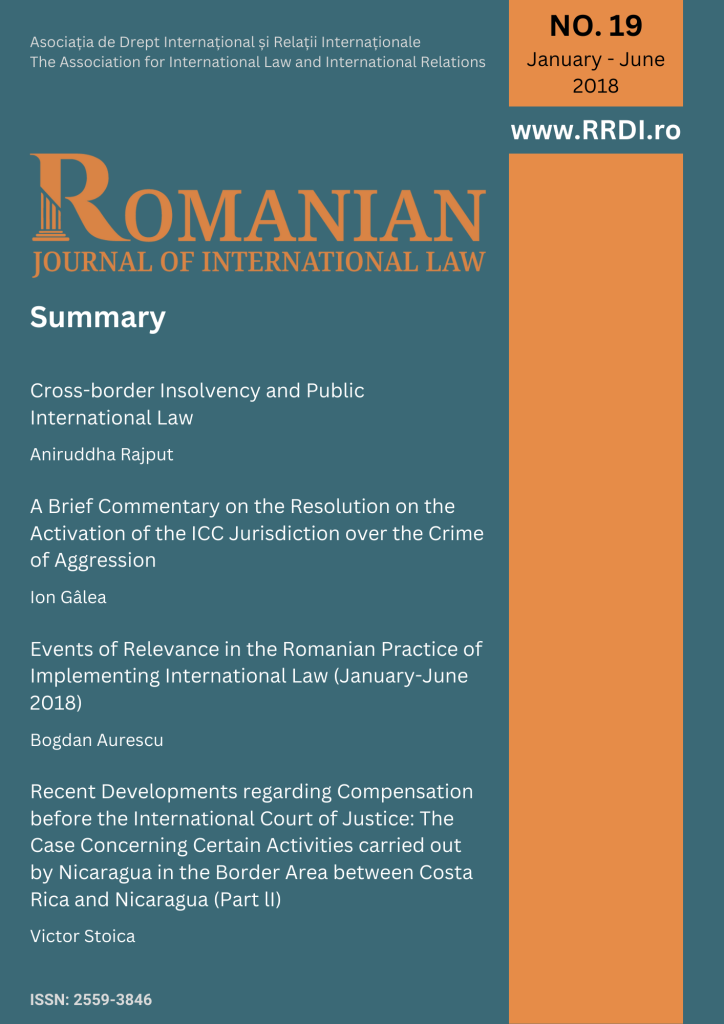Cross-border Insolvency and Public International Law
Aniruddha RAJPUT
The legal issues arising from cross-border insolvency primarily belong to the domain of private international law. However, in recent times, crossborder insolvency is arising under and giving rise to issues of public international law. The problems posed by cross-border insolvency are complicated, since the legal system in different States is diverse and there is no unified framework. Equally important are issues of efficiency and effectiveness of proceedings. We will be addressing all these issues and provide potential solutions in the present paper.
A Brief Commentary on the Resolution on the Activation ofthe ICC Jurisdiction over the Crime of Aggression
Ion GÂLEA
On 14 December 2017, the Assembly of States Parties to the Statute of the International Criminal Court adopted by consensus a Resolution on the activation of the Jurisdiction of the Court over the crime of aggression. However, this Resolution contains an element of interpretation which seems to have given an answer to an important debate that preceded the activation of the jurisdiction over the crime of aggression. This article is a continuation of a previous study that attempted to explain the problem and the options for interpreting the Kampala Amendment. Thus, the present study proposes a brief analysis over the interpretative solution that has been suggested in the text of the Resolution and appears to be confirmed by the reactions of the States, following the adoption of the Resolution,
Events in the Romanian Practice of Implementing International Law (January-June 2018)
Bogdan AURESCU
This brief presentation of the Romanian practice during the first semester of 20182 in implementing international law tries to give an overview of what can be termed as a very rich activity of the Romanian authorities in this field. The paper describes the legal positions expressed on various occasions regarding events with relevance to international law, legal procedures regarding important agreements signed by Romania, Romania’s participation to the most important international organizations etc.
L’arrêt Al Nashiri c. Roumanie – le Retour des Black Sites devant le Juge de Strasbourg
Carmen-Gina ACHIMESCU
Dans l’affaire Al Nashiri c. Roumanie2 la Cour EDH a du analyser des aspects extrêmement délicats relatifs à l’applicabilité de la Convention en cas de violation des droits garantis commises sur le territoire d’un Etat partie à la Convention par les agents d’un Etat tiers. Notre analyse ne portera pas sur les nombreuses violations substantielles de la Convention constatées dans l’affaire, mais sur la question de l’imputabilité des faits, ainsi que sur la preuve des omissions coupables de la Roumanie, qui ont engagé sa responsabilité sur le terrain de la CEDH.
Recent Developments regarding Compensation before the International Court of Justice: The Case Concerning Certain Activities carried out by Nicaragua in the Border Area betweenCosta Rica and Nicaragua – Part II
Victor STOICA
This article studies the manner in which compensation is interpreted and how it currently applies before the International Court of Justice through the perspective of the Case Concerning Certain Activities Carried out by Nicaragua in the Border Area.
The Problematic of an Automated Effect and Margin of Appreciation in the Context of UN Targeted Sanctions Implementation Challenges
Cătălin-Nicușor GHINEA
The establishment of the Sanctions Regimes at the UN level with direct effects on individuals and entities has created a global jurisdiction, without also assuring at the outset a proper implementation control, an aspect viewed as a substantial imbalance.3 Though considered “smart” or “targeted”, the UN Sanctions being assimilated with preventive measures, their effectiveness and mandatory nature depend on the supranational action4 of the Security Council, which extend to the actual implementing manner adopted by the Member States. Yet, the burden of objectives’ accomplishments relies almost solely on the proper enforcement decisions at domestic level. As the States, on one hand, are obliged by the UN Charter of engaging in a specific conduct in order to ensure an exact application of the respective UN Resolutions instituting sanctions and, on the other hand, the availability of a real margin of appreciation is called into question, the national and European authorities (EU level), in particular, were confronted with the never-ending dilemma of the exact effects set under the international law of the UN membership status and of Articles 25 and 103 of the UN Charter, when dealing with specific UN Targeted Sanctions.

